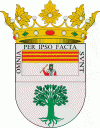Canillas de Aceituno (Canillas de Aceituno)
 |
 |
Canillas de Aceituno has an altitude of around 524 meters at the foot of the Sierra de Tejeda and is crowned by the peak of La Maroma at 2,068 meters, the highest in the province. It is a town of narrow streets that are immaculately whitewashed, Moorish arches and corners of flowers.
The people of Canillas de Aceituno called canilleros. Most have their profession within the town, although there are some people who work outside. They typically work in construction and agriculture. Canillas de Aceituno has shops where one can purchase basic products.
Canillas de Aceituno is 61 kilometers from Málaga. It is accessible through the highway C-335 and the local M-125 from Vélez-Málaga.
The geographic location of Canillas de Aceituno makes it a natural balcony of Axarquia. It adjoins the Sierras of Tejeda, Almijara and Alhama Natural Park to the north. The road to the village offers views of the Velez and Rubite valleys, through a landscape of olive plantations, vineyards, almond and fig trees. On the hills or mountains one can see the awnings ready to dry the grapes for raisins. This tree abundance is made possible by the Almanchares, Bermuza and Rubite rivers, which also facilitate the existence of natural springs such as the Gazuela and the Ivy. In the environment of Canillas is abundant with natural caves highlighted by the Fajara, four kilometers from the villa, in whose interior are the tunnels up until a kilometer and a half.
Inside the village there are two natural springs that feed on an Arab cistern located under the city council. One of the streets of archaeological interest is the Castillo street, which there are still remains of what was once an ancient fortress and leading to a lower neighborhood, through Estación street. The Cemetery street lies above an old Arab cemetery.
During the Andalusian earthquake of 25 December 1884 15% of houses collapsed and 65% were badly damaged. There were 6 dead, 4 seriously injured and more than 30 minor injuries. The upper neighborhood suffered major damage, although there were no fatalities in it.
Map - Canillas de Aceituno (Canillas de Aceituno)
Map
Country - Spain
 |
 |
| Flag of Spain | |
Anatomically modern humans first arrived in the Iberian Peninsula around 42,000 years ago. The ancient Iberian and Celtic tribes, along with other pre-Roman peoples, dwelled the territory maintaining contacts with foreign Mediterranean cultures. The Roman conquest and colonization of the peninsula (Hispania) ensued, bringing the Romanization of the population. Receding of Western Roman imperial authority ushered in the migration of different non-Roman peoples from Central and Northern Europe with the Visigoths as the dominant power in the peninsula by the fifth century. In the early eighth century, most of the peninsula was conquered by the Umayyad Caliphate, and during early Islamic rule, Al-Andalus became a dominant peninsular power centered in Córdoba. Several Christian kingdoms emerged in Northern Iberia, chief among them León, Castile, Aragon, Portugal, and Navarre made an intermittent southward military expansion, known as Reconquista, repelling the Islamic rule in Iberia, which culminated with the Christian seizure of the Emirate of Granada in 1492. Jews and Muslims were forced to choose between conversion to Catholicism or expulsion, and eventually the converts were expelled through different royal decrees.
Currency / Language
| ISO | Currency | Symbol | Significant figures |
|---|---|---|---|
| EUR | Euro | € | 2 |
| ISO | Language |
|---|---|
| EU | Basque language |
| CA | Catalan language |
| GL | Galician language |
| OC | Occitan language |
| ES | Spanish language |
















